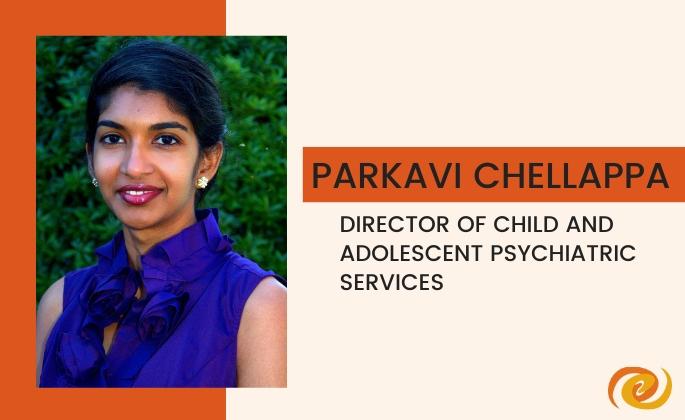Tell us about yourself!
I am Parkavi Chellappa (she/her), MD, the Director of Child and Adolescent Psychiatric Services in North Carolina. I have been with The Emily Program for almost seven years.
How does a collaborative approach to eating disorder treatment benefit clients?
Eating disorders are usually sneaky and try to find loopholes to get away with behaviors, even when the client genuinely wants to get better. This eating disorder characteristic can often get in the way of a client’s recovery. By having all the disciplines providing care to a client under one roof, working toward the same goals collaboratively, we can plug those holes and support the client better. We can also pool resources to make support available to clients and their families multiple times during the day and over the course of treatment, which is more than humanly possible for a provider from any one discipline working alone.
Collaborative care ensures timely detection of eating disorder complications and side effects, which can then be addressed quickly. It also helps the clinicians treating the clients, as they can get updates from other disciplines to help modify or dictate their own next steps in the client’s care.
What is unique about psychiatric care within child and adolescent eating disorder treatment compared to other populations?
When the client with the eating disorder is a child or an adolescent, often, the treatment strategies are for the whole family. So, we address concerns from parents or guardians and provide support and education to them in addition to their child or adolescent receiving treatment. There is a lot of learning and practicing skills at various levels of care. This is very unique to eating disorder clients in comparison to children and adolescents with other psychiatric illnesses, for instance.
What motivates you to show up for work each day?
I’m motivated by my responsibility to my clients, so they can live their lives to the fullest without being restrained by the clutches of their eating disorders, as well as my responsibility to my colleagues, so they do not have to do my work in addition to theirs.
What do you like to do when you aren’t working?
I enjoy traveling far and wide to soak in history and different cultures. (By the end of this year, I will have traveled to five continents and at least 35 of 50 states in the USA). I also like gardening, cooking, and watching movies with my family.
What’s one thing most people don’t know about you?
I have lived, worked, and trained on three different continents.
